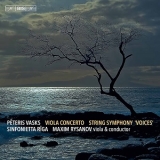 Peteris Vasks: Konzert für Viola und Streichorchester, Streichersymphonie Voices; Maxim Rysanov, Viola & Ltg., Sinfonietta Riga; 1 SACD BIS 2443; Aufnahme 10/2018, Veröffentlichung 01/05/2020 (65'44) - Rezension von Remy Franck
Peteris Vasks: Konzert für Viola und Streichorchester, Streichersymphonie Voices; Maxim Rysanov, Viola & Ltg., Sinfonietta Riga; 1 SACD BIS 2443; Aufnahme 10/2018, Veröffentlichung 01/05/2020 (65'44) - Rezension von Remy Franck
Der 1946 geborene lettische Komponist Peteris Vasks schrieb sein Bratschenkonzert im Jahre 2014. Es wurde vom Widmungsträger, dem britisch-ukrainischen Bratscher und Dirigenten Maxim Rysanov uraufgeführt, der es auch in dieser Ersteinspielung spielt und dirigiert.
Das Werk ist in vier Sätze unterteilt, Andante, Allegro moderato, Andante und Adagio. Wie bei diesem Komponisten zu erwarten, ist es eine sehr sinnliche Musik, die in den ersten 3 Sätzen (ca. 25′) zu dem führt, was trotz der Brüche, die es in dem Stück gibt, als sanfte, pastoral-hymnische Vollendung bezeichnet werden kann.
Es ist eine durchaus abwechslungsreiche Komposition, denn nach dem sehr lyrischen ersten Satz kommt ein tänzerisches Allegro moderato, gefolgt von einem zunächst hoffnungsvollen, dann aber brutal düsteren Andante, dessen Stimmung bis ins Adagio hinüberklingt.
Vasks Symphony Voices von 1991 besteht aus 3 Sätzen, Stimmen der Stille, Stimmen des Lebens und Stimme des Gewissens. Die Komposition ging einher mit dem Ende der Sowjetdiktatur in Lettland. Der erste Satz könnte als Unterdrückung, als Zwang zum Schweigen bezeichnet werden, der zweite als ein Erwachen der Natur und des Lebens, was der Komponist letztlich sehr kritisch sieht. Wie sonst wäre die konfliktreiche und fast kakophonische Entwicklung des Satzes zu erklären? Die Antwort liefert der 3. Satz, mit seiner sehr eindringlichen musikalischen Gewissenserforschung.
Die Sinfonietta Riga spielt beide Werke mit viel Engagement und auf hohem musikalischem Niveau. Auch auf der Bratsche überzeugt Maxim Rysanov als intensiv musizierender Solist. Das sind Interpretationen, die von reifer Musikalität und großer Intensität zeugen, spannungsgeladen und phantasievoll den Zuschauer von der ersten bis zur letzten Note fesseln.
Latvian composer Peteris Vasks, born in 1946, wrote his Viola Concerto in 2014. It was premiered by the dedicatee, the British-Ukrainian viola player and conductor Maxim Rysanov, who also plays and conducts it in this first recording.
The work is divided into four movements, Andante, Allegro moderato, Andante and Adagio. As one might expect from this composer, it is a very sensual music, whose first three movements lead to what can be described as a gentle, pastoral-hymnic conclusion, despite the breaks that exist in the final movement.
It is a thoroughly varied composition, for after the very lyrical first movement comes a dance-like Allegro moderato, followed by an initially hopeful, but then brutally sombre Andante, whose mood spills over into the Adagio.
Vask’s Symphony Voices from 1991 consists of 3 movements, Voices of Silence, Voices of Life and Voice of Conscience. The composition coincided with the end of the Soviet dictatorship in Latvia. The first movement depicts the still ongoing oppression and the compulsion to silence, the second could compared to an awakening of nature and life, which the composer ultimately views very critically. How else could one explain the conflictive and almost cacophonous development of the movement? The answer is provided by the third movement, with its very penetrating musical exploration of conscience.
The Sinfonietta Riga plays both works with great commitment and on a high musical level. Maxim Rysanov is also convincing as a captivating soloist. The recordings prove the performers mature musicality and are truly exciting, coming along with great intensity.






















